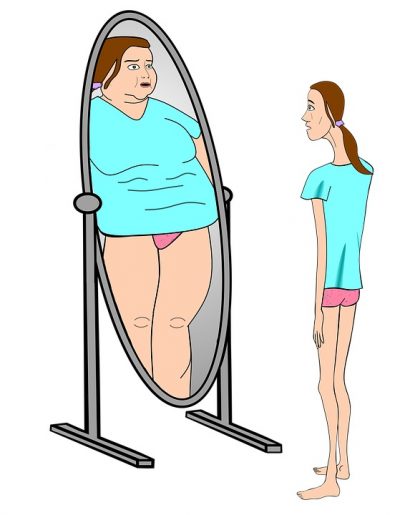The Destructive Nature of Eating Disorders
A Look at the Mental and Physical Impacts of Eating Disorders

March 26, 2019
In today’s society, there is an immense amount of pressure on people to look a certain way and to fit into high standards that are often unrealistic. It’s impossible to avoid these cultural preferences, as they can be found almost everywhere, from magazine covers and commercials to social media. Despite food being an absolute necessity, these societal pressures can lead to people going to extreme measures to fit into the mold that people expect them to; eating disorders. Arguably the hardest part about this is that everyone needs food, and most people don’t only eat when they’re hungry. They eat because it tastes good, they’re bored, or they’re with friends who are eating, and it can be hard to avoid. There are many types of eating disorders, that can be anything from only eating at night, to only eating objects that are not meant to be eaten. Three of the most common types of eating disorders are anorexia nervosa, bulimia nervosa, and binge eating disorder.
Anorexia is an eating disorder that mostly affects young women, and it is, essentially, the pathological fear of getting fat, which leads to them having distorted body image, dieting excessively/being way too restrictive, and emaciation. Bulimia also affects more women than men, and it is characterized by usually normal weight women having frequent periods of excessive food intake, followed by purposefully making themselves vomit to avoid weight gain. A binge eating disorder, the most common out of the three, is defined as the uncontrollable and excessive intake of whatever food is available to the person at the time, and a binge episode often happens following a stressful/emotional situation or event.
All of these eating disorders have different things that experts believe can cause them. One of them is genetics, as research shows that if one twin develops an eating disorder, there is a 50% likelihood that the other will develop the same disorder, even if they were separated at birth. Personality traits may also cause one of these disorders, especially if one or more of the traits is impulsivity, perfectionism, or neuroticism. Someone can also be more likely to establish an eating disorder if they are exposed to high standards of thinness, and the disorders are almost nonexistent in cultures that have not been introduced to these ideas. One of the causes that has been most recently discovered is brain biology and structure, particularly the levels of the brain messengers dopamine and serotonin.
An eating disorder has obvious effects, such as extreme weight loss, malnutrition, fatigue, bloating, weakness and many others when it comes to anorexia and bulimia. If it’s a binge eating disorder some of the more noticeable effects are weight gain, lethargy, and joint pain due to osteoarthritis. Despite this, not all of the effects are able to be seen, and weight doesn´t always determine whether or not someone has an eating disorder. There are also a lot of psychological effects that come along with disordered eating.
Each eating disorder has its own mental effects that help determine if a person has one of the disorders or if they have symptoms for unrelated reasons. These effects must be addressed and understood before recovery can occur. Anorexia has a lot of psychological effects, one of them being depression. This is almost like a “which came first, the chicken or the egg” situation. Does the person develop anorexia because they’re depressed, or do they develop depression because they’re anorexic? The answer to this question is in a grey area, as it is believed to be a little bit of both, but it is proven that as they have the disease longer and longer, the depression gets worse and worse. People with anorexia also have low self-esteem and tend to see themselves as worthless or not good enough, which are signs of depression as well. Some people with anorexia will pick up other self-mutilating behaviors, such as cutting or burning themselves as a way to cope with painful emotions. They will usually remove themselves from social situations, particularly those involving food, such as a lunch outing or a birthday party. Anorexics are also usually secretive about how much they eat and will get angry when people show that they are worried about them. Both of these things will end up having a negative impact on their relationships and make it easier to not eat because they won’t have people around them as much.
Bulimia also has lots of effects on mental health. The binge-purge cycle seems to be a result of feelings of shame and guilt and a lack of control. It can also be because of distorted body image or seeing one’s body differently than it actually is when they look at themselves. Stress and anxiety can also come out of bulimia as a result of having to keep their disorder a secret. Some other mental health concerns that come along with bulimia nervosa are mood swings, depressive thoughts or actions, self-harm, self-isolation, low self-esteem, general anxiety, and obsessive-compulsive or impulsive behaviors.
Binge eating disorders are often a result of feeling like food is a reward, which makes a person feel good about themselves while eating, or it can be a reduced ability to control one’s intake of food. Experts believe that it may be a mixture of both due to conflicting research that shows both a decrease in control and an increased sensitivity to reward as they seem to feel like food is a prize. This sensitivity can increase over time as the disorder gets worse and the person with the disorder will start to seek any positive reinforcement, not only food related. People with binge eating disorders tend to have a decrease in their performance when it comes to tasks that require attention and control.
These are three of the most common eating disorders, but each of them are different and need different treatment. Anorexia is usually treated using a team approach, meaning that doctors, dietitians, and mental health professionals all work together to help the patient, who is often hospitalized or in a treatment center. Bulimia has several effective treatments, but mixing psychotherapy with antidepressants seems to be the most successful in overcoming the disorder. Binge eating disorder is treated using psychotherapy, medications, and behavioral weight-loss programs. Treatment for any of these disorders may also address any mental-health concerns, such as depression, that come along with an eating disorder.
For more information or help with any of these disorders, more information can be found at the following sources:
National Eating Disorders Association Helpline: (800) 931 2237
Treatment: https://www.nationaleatingdisorders.org/find-treatment/treatment-and-support-groups
Forums/Support Groups:









